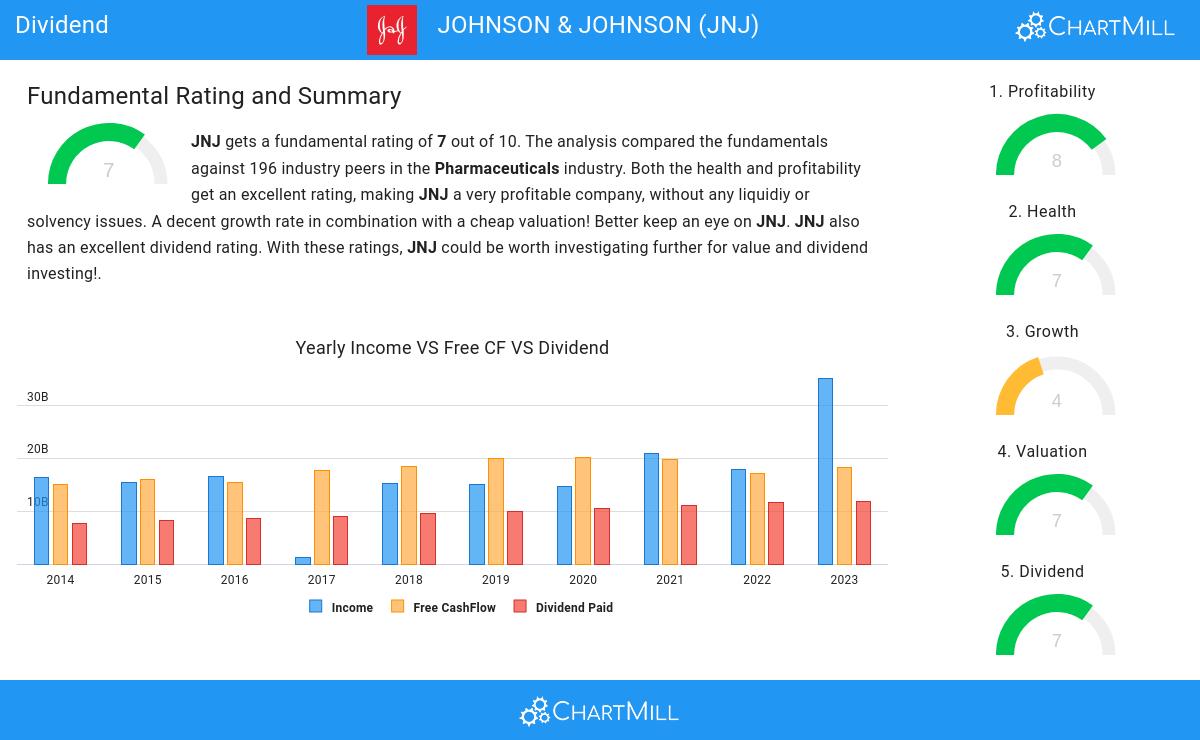Why NYSE:JNJ is a Top Pick for Dividend Investors.
By Mill Chart
Last update: Oct 15, 2024
JOHNSON & JOHNSON (NYSE:JNJ) was identified as a stock worth exploring by dividend investors by our stock screener. NYSE:JNJ scores well on profitability, solvency and liquidity. At the same time it seems to pay a decent dividend. We'll explore this a bit deeper below.

Assessing Dividend Metrics for NYSE:JNJ
ChartMill assigns a Dividend Rating to every stock. This score ranges from 0 to 10 and evaluates the different dividend aspects, including the yield, the growth and sustainability. NYSE:JNJ scores a 7 out of 10:
- JNJ's Dividend Yield is rather good when compared to the industry average which is at 3.84. JNJ pays more dividend than 93.81% of the companies in the same industry.
- Compared to an average S&P500 Dividend Yield of 2.22, JNJ pays a bit more dividend than the S&P500 average.
- On average, the dividend of JNJ grows each year by 9.96%, which is quite nice.
- JNJ has paid a dividend for at least 10 years, which is a reliable track record.
- JNJ has not decreased its dividend for at least 10 years, so it has a reliable track record of non decreasing dividend.
- 30.49% of the earnings are spent on dividend by JNJ. This is a low number and sustainable payout ratio.
Deciphering NYSE:JNJ's Health Rating
ChartMill utilizes a Health Rating to assess stocks, scoring them on a scale of 0 to 10. This rating takes into account a variety of liquidity and solvency ratios, both in absolute terms and in comparison to industry peers. NYSE:JNJ has earned a 7 out of 10:
- An Altman-Z score of 4.29 indicates that JNJ is not in any danger for bankruptcy at the moment.
- JNJ has a better Altman-Z score (4.29) than 75.77% of its industry peers.
- The Debt to FCF ratio of JNJ is 2.04, which is a good value as it means it would take JNJ, 2.04 years of fcf income to pay off all of its debts.
- JNJ has a Debt to FCF ratio of 2.04. This is amongst the best in the industry. JNJ outperforms 94.33% of its industry peers.
- Even though the debt/equity ratio score it not favorable for JNJ, it has very limited outstanding debt, so we won't put too much weight on the DE evaluation.
- JNJ does not score too well on the current and quick ratio evaluation. However, as it has excellent solvency and profitability, these ratios do not necessarly indicate liquidity issues and need to be evaluated against the specifics of the business.
Profitability Examination for NYSE:JNJ
ChartMill utilizes a Profitability Rating to assess stocks, scoring them on a scale of 0 to 10. This rating takes into account a variety of profitability ratios and margins, both in absolute terms and in comparison to industry peers. NYSE:JNJ has earned a 8 out of 10:
- JNJ has a Return On Assets of 20.99%. This is amongst the best in the industry. JNJ outperforms 97.94% of its industry peers.
- JNJ has a better Return On Equity (53.14%) than 97.42% of its industry peers.
- JNJ's Return On Invested Capital of 15.89% is amongst the best of the industry. JNJ outperforms 92.78% of its industry peers.
- The 3 year average ROIC (14.68%) for JNJ is below the current ROIC(15.89%), indicating increased profibility in the last year.
- JNJ has a better Profit Margin (43.91%) than 97.42% of its industry peers.
- In the last couple of years the Profit Margin of JNJ has grown nicely.
- JNJ has a better Operating Margin (28.78%) than 94.33% of its industry peers.
- In the last couple of years the Operating Margin of JNJ has grown nicely.
- JNJ has a better Gross Margin (69.43%) than 73.71% of its industry peers.
Every day, new Best Dividend stocks can be found on ChartMill in our Best Dividend screener.
For an up to date full fundamental analysis you can check the fundamental report of JNJ
Keep in mind
This article should in no way be interpreted as advice. The article is based on the observed metrics at the time of writing, but you should always make your own analysis and trade or invest at your own responsibility.
206.37
-1.94 (-0.93%)
Find more stocks in the Stock Screener
JNJ Latest News and Analysis



